Gerhart Hauptmann
| Gerhart Hauptmann | |
|---|---|
 | |
| Born |
Gerhart Johann Robert Hauptmann 15 November 1862 Obersalzbrunn, Silesia, Prussia |
| Died |
6 June 1946 (aged 83) Agnetendorf (Jagniątków), People's Republic of Poland |
| Occupation | Dramatist |
| Nationality | German |
| Literary movement | Naturalism |
| Notable works | The Weavers, The Rats |
| Notable awards |
|
|
| |
| Signature |
 |
Gerhart Johann Robert Hauptmann[1] (15 November 1862 – 6 June 1946) was a German dramatist and novelist. He is counted among the most important promoters of literary naturalism, though he integrated other styles into his work as well. He received the Nobel Prize in Literature in 1912.
Life
Childhood and youth
Gerhart Hauptmann was born in 1862 in Obersalzbrunn, now known as Szczawno-Zdrój, in Lower Silesia (then a part of Prussia, now part of Poland). His parents were the Robert and Marie Hauptmann, who ran a hotel in the area. As a youth, Hauptmann had a reputation of being loose with the truth. Beginning in 1868, he attended the village school and then, in 1874, the Realschule in Breslau for which he had only barely passed the qualifying exam. Hauptmann had difficulties adjusting himself to his new surroundings in the city. He lived, along with his brother Carl, in a somewhat run-down student boarding house before finding lodging with a pastor. He also ran into problems with the Prussian-influenced school. Above all the strictness of the teachers and the better treatment of his noble classmates. His dislike and numerous illness which kept him from attending class, led to his having to repeat his first year. Over time, he came to appreciate Breslau because of the opportunity to visit the theater.

In the spring of 1878, Hauptmann left the Realschule to learn agriculture on his uncle's farm in Lohnig (today Łagiewniki Średzkie in Gmina Udanin, Poland). After a year and a half, however, he had to break off his training. He was not physically prepared for the work and he had a contracted a life-threatening lung ailment that troubled him for the next twenty months.
Studies and life as a sculptor
After he failed to pass an officer entry exam for the Prussian Army, Hauptmann entered the sculpture school at the Royal Art and Vocational School in Breslau in 1880. There he met Josef Block who became a lifelong friend. After a temporary expulsion, due to "poor behavior and insufficient diligence," and a quick reinstatement at the recommendation of sculptor and Professor Robert Härtel, Hauptmann left the school in 1882. For his brother's wedding, he wrote a short play, Liebesfrühling, that was performed on the night before the wedding. Also at the wedding, he met the bride's sister, Marie Thienemann. He secretly became engaged to her and Marie began supporting him financially, which enabled him to begin a semester of studying philosophy and literary history at the University of Jena, which he soon quit.
After he left Jena, Marie financed a Mediterranean trip, which he undertook with his brother Carl. On the trip, he decided to settle in Rome as a sculptor, however he had little success. His attempt to establish himself as part of Rome's German expatriate community also failed and his large clay sculpture of a German warrior collapsed. Hauptmann returned to Germany, disappointed and began a brief stint at the Royal Academy in Dresden before beginning to study history at Humboldt University of Berlin. While there, he devoted his interests to the theater rather than to his studies.
In 1891 he moved to Schreiberhau in Silesia. It was followed by The Reconciliation (1890), Lonely People (1891) and The Weavers (1892), a powerful drama depicting the uprising of the Silesian weavers in 1844 for which he is best known outside of Germany.
Marriage and beginning as a writer
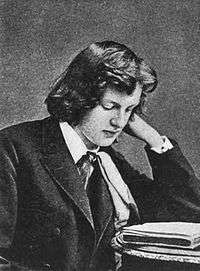
Hauptmann married Marie Theienemann in Radebeul on May 5, 1885. In July, they took their honeymoon to Rügen along with Carl and his wife, Marie's sister, Martha. They visited the island of Hiddensee, which would become a favorite retreat of Hauptmann's. Because the city air bothered Gerhart's lungs, the couple spent the first four years of their marriage in the town of Erkner where their three sons were born. In 1889, they moved to Charlottenburg in Berlin. There he joined the naturalist literary club "Durch," which included among others Karl Bleibtreu and Wilhelm Bölsche.
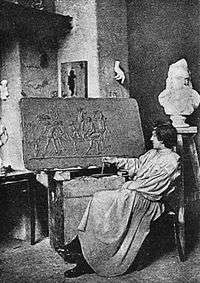
During this period he began to write. His first work was a "novelistic study" Signalman Thiel in 1888. His first play, Before Sunrise, was first staged in 1889, directed by Otto Brahm. It inaugurated the naturalistic movement in modern German literature. It was followed by The Reconciliation (1890), Lonely People (1891) and The Weavers (1892), a powerful drama depicting the rising of the Silesian weavers in 1844 for which he is best known outside of Germany. His work also included comedies, including Colleague Crampton (1891) and The Beaver Coat (1893).
In 1893, he also took actress Margarete Marschalk as his lover. In order to get some distance, Marie moved to the US with their sons. Hauptmann prepared the first French performance of his play The Assumption of Hannele and then went after Marie, without even staying for the premiere. The rift, however, was not to be bridged. After several years of separation, the marriage was ended in July, 1904. However, Marie continued to live in the villa Hauptmann had built in Dresden.
Recognition and World War I
From 1901, Hauptmann lived with Margarete Marschalk in Agnetendorf (today Jagniątków in Poland). He called it "the mystical protective sheathing of my soul." In the preceding year, Margarete had born him a son, Benvenuto. In September, 1904, they were married; this second marriage lasted until his death, though it was thrown into a serious crisis in 1905 and 1906 by his affair with a 16-year-old actress, Ida Orloff.
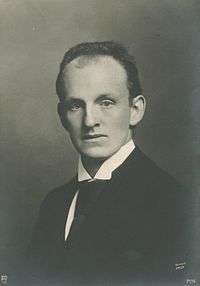
In 1910, Hauptmann's first novel was published, The Fool in Christ, Emanuel Quint, which told the story of a wandering preacher who mixed sun worship and Christianity together. His 1912 novel, Atlantis became the basis for a Danish silent film of the same name. The novel was written one month before the RMS Titanic disaster, and the film's 1913 release was less than one year after the event. The storyline for both involved a romance aboard a doomed ocean liner, and the similarity to the disaster became obvious. This coincidental untimeliness caused the film to be banned in Norway[2] due to perceived insensitivity. Nevertheless, excited by the possibilities of this new medium, Hauptmann wrote several screenplays (e.g. Appolonius of Tyre), none of which was ever filmed.
Around the turn of the century, Hauptmann began to receive official recognition. Three times he was awarded the Austrian Franz-Grillparzer-Preis. He also received honorary doctorates from Worcester College at Oxford in 1905 and from the University of Leipzig in 1909. In 1912, he was awarded the Nobel Prize for Literature "primarily in recognition of his fruitful, varied and outstanding production in the realm of dramatic art", after he had been nominated in that year by Erich Schmidt, member of the Prussian Academy of Science.[3][4]

Kaiser Wilhelm II, however, did not care for the "social democratic" poet. He vetoed the awarding of the 1896 Schiller Preis (for The Assumption of Hannele) and at the instigation of his son, Crown Prince Wilhelm, in 1913, a Breslau production of Hauptmann's play Commemoration Masque (Festspiel in deutschen Reimen) was canceled, because in it the hundredth anniversary of the Liberation of Germany from Napoleon was depicted with a pacifistic rather than patriotic or jingoistic tone. However, the very same Hauptmann who had criticized militarism in the Masque, the very next year was among those who supported the war. Hauptmann signed the Manifesto of the Ninety-Three, a manifesto signed by 93 German scientists, scholars and artists, declaring their unequivocal support of German military actions at the beginning of World War I. Hauptmann also published supportive poems (many of which read as unintentional satires and which he later crossed out in the manuscript). In 1915, Wilhelm II awarded him the Order of the Red Eagle, Fourth Class. After Germany's military defeat and the fall of the monarchy, Hauptmann fled to the pacifist colony Monte Verità in near Locarno, Switzerland. Several years later, he wrote Till Eulenspiegel, a poetic memorial to Hans Paasche, the pacifist and reformer who was assassinated by ultra-nationalists.
Representative Poet of Germany
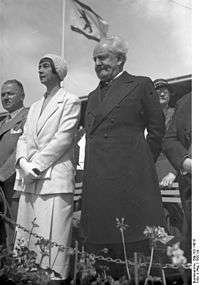
In 1918, he joined a declaration, signed by a number of German intellectuals and published in the Berliner Tageblatt newspaper, showing solidarity with the Republic. During the early years of the republic, he was considered as a candidate for the Reichspräsident and offered the position of Reichskanzler, which he turned down. In the following years, he was the first recipient of the Adlerschild des Deutschen Reiches (The Eagle Shield of the German Empire) an award for scholarly or artistic achievement. During this period, the demand for Hauptmann's work had declined, to the point where, in order to maintain his lifestyle, he had begun to do films and serializations. Despite this, he continued to enjoy popularity. He was seen abroad as the representative of German Literature. In 1932, in honor of the centenary of Goethe's death, he went on a lecture tour of the United States and was awarded and honorary doctorate from Columbia University.[5] In addition he was awarded the Goethe Prize of the city of Frankfurt am Main.
On his 70th birthday, he was awarded several honorary citizenships. There were countless exhibitions and performances of his work, many with well-known performers. Max Reinhardt played the lead in the premiere of Hauptmann's new play Before Sunset. From 1926 until 1943, Hauptmann summered with his family in Hiddensee.
The Nazi era
After the Nazis seized power in Germany in 1933, Hauptmann signed a loyalty oath of the German Academy of Literature, a section of the Prussian Academy of Arts. In the summer of the same year, according to writer and historian Ernst Klee, he applied for membership in the Nazi party but his application was denied by the regional party office. His copy of Mein Kampf was also heavily annotated, which can now be found in the Hauptmann collection at the Berlin State Library. However, in his self-image, Hauptmann remained a poet, above the political fray. Furthermore, nothing from the Nazi ideology was incorporated into his works. However, he had earlier been a founding member of the eugenics organization the German Society for Racial Hygiene in Berlin in 1905 and his play Before Sunrise is deeply concerned with hereditary alcoholism, a popular idea with eugenicists, and the main character rejects his fiancee due to concerns about his children's genetics. Nevertheless, a report from the Amt Rosenberg, the Nazi culture policy body, from 1942 stated: "With all recognition of Hauptmann's artistic creative power, the ideological stance of most of his works is, from a national-socialist perspective, to be regarded very critically."
Hauptmann remained highly regarded by the people, for which reason the Nazis did everything to keep him from leaving the country, despite the emigration of many of his colleagues. Nevertheless, the censors of the Propaganda Minister Goebbels kept an eye on Hauptmann's work and even banned a new edition of his novella The Shot in the Park because it featured a black character. Hauptmann was told the reprinting was impossible because of a paper shortage. Furthermore, the film versions of The Beaver Coat and Before Sunrise were censored and the film adaptation of Schluck and Jau was banned. For Hauptmann's 80th birthday, in 1942, the representatives of the Nazi regime cooperated with honors, celebrations, and celebratory performances. Hauptmann was presented by his publisher with the first copy of his 17-volume Complete Works.
Hauptmann lived through the end of World War II in his house "Wiesenstein." In 1944, he published his Atreus Tetralogy, which he had been working on for four years. It was composed of Iphigenia in Delphi, Iphigenia in Aulis, Agamemnon's Death, and Electra. In 1944, Hauptmann's name was included in the Gottbegnadeten list (the "God-gifted list"), a list of artists considered crucial to the Nazi movement and who were therefore exempt from mobilization in the war effort, and he was one of the six most important writers in the special list of the "irreplaceable artists."
During the bombing of Dresden, Hauptmann was staying at a Dresden sanatorium due to severe inflammation of the lungs. He said of the inferno, "Whoever had forgotten how to cry, learned again at the destruction of Dresden. I stand at the end of my life and envy my dead comrades, who were spared this experience." After the war, Silesia, where he lived, became part of Poland. Hauptmann was temporarily allowed to stay due to a letter of protection. Then, on April 7, 1946, Hauptmann was informed by the Soviets that the Polish government was insisting on his resettlement. However, before his expulsion, he became very ill.
Death
At the beginning of May 1946, Hauptmann learned that the Polish government was insisting on the expulsion of all Germans without exception. On June 6, he died of bronchitis in Agnieszków (present-day Jagniątków). His last words were reported to be, "Am I still in my house?" Despite his final wishes, as expressed in his last will, Hauptmann was not buried at his home. An official letter from the Soviet Administration in favor of the writer, who was highly regarded in the Soviet Union, proved ineffective, though the family was permitted to take its belongings. Only an hour after his death, the local militia had gathered outside the window directly under his deathbed and banging pots and pans and blowing whistles and trumpets.[6] Hauptmann's body was put in a zinc-lined casket and placed in his study. The approval for the promised departure on a special train was a long time coming. More than a month after his death, a Soviet representative requested the Polish administration authorize the transfer of Hauptmann's remains to Germany on hygienic grounds. A few days later, the coffin was taken to Germany. The trip was reconstructed in the 1988 documentary film "Der Hauptmann-Transport."
At a funeral service held in Stralsund, near Hauptmann's summer home on Hiddensee island, Wilhelm Pieck, then co-chairman of the Socialist Unity Party of Germany in the Soviet occupation zone of Germany spoke, along with poet Johannes R. Becher, and Soviet official Sergei Ivanovich Tiulpanov all spoke. On the morning of July 28, 52 days after his death, Hauptmann was buried before sunrise at the cemetery in Hiddensee. His widow mixed a small sack earth from the Riesengebirge/Karkonosze Mountains (Krkonoše) in Silesia with the sandy soil of the Baltic coast where he was buried.
In 1951, a granite block was unveiled as the grave stone. It bore, as per Hauptmann's wish, only his name. In 1983, his wife Margarete's remains were moved to lie beside her husband's, though she had died in 1957.
Work
Influences
Hauptmann first encountered the various representatives of the naturalist movement through the avant-garde society "Durch" in 1885, which was an important influence. The society hearkened back to historical examples from the Sturm und Drang movement, especially the circle centered on the Hart Brothers up until the Vormärz period before the revolutions of 1848. At their meetings, aesthetic questions about idealism, Realism and the naturalist movement were discussed. Hauptmann gave a lecture about the theretofore largely forgotten poet and dramatist Georg Büchner. With that, he also established his naturalistic orientation.
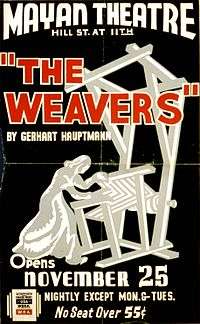
At the end of the 1880s, he was confronted with the incipient anti-socialist movement. The first of the Anti-Socialist Laws was passed in 1878 and strengthened in 1887. Hauptmann was in 1887 as called before the court in Breslau, because he had been a follower of the "Icharians," whose ideas hearkened back to the ideas of French communist Etienne Cabet. He sought refuge in his brother's house in Zurich in order to avoid prosecution. While there he encountered psychiatrist August Forel and the preacher Johannes Guttzeit, whose ideas influenced Before Sunrise. Hauptmann's early dream of a utopian-socialist community were further fed by his encounter with the poet Gusto Gräser, whose communal colony Hauptmann would visit several times in 1919. The story The Heretic of Soana, the novel The Fool in Christ Emmanuel Quint, and the final chapter of Till Eulenspiegel deal with his experience of a Dionysian-Jesuanic itinerant prophet.
Naturalism
Hauptmann began producing naturalistic works in Zurich. From there, he sent the manuscript of "Bahnwärter Thiel," his first naturalistic work, to Munich to be read by the critic Michael Georg Conrad. Hauptmann's 1889 play "Before Sunrise" caused one of the largest scandals in German theater history. The bourgeois audience was shocked by the frank depictions of alcoholism and sexuality. According to Franz-Josef Payrhuber, "Before Sunrise" was an epoch-making work, but it is not the representative example of naturalistic drama, that label would go to Die Familie Selicke by Arno Holz and Johannes Schlaf. Hauptmann however did have an important role, with the support of Otto Brahm, in establishing naturalistic drama on the German stage. Theaters under Brahm's leadership premiered 17 of Hauptmann's plays. Those plays, and the numerous performances across Germany, gave Naturalism its first broad exposure and social impact.
With his most important play, "The Weavers," which he had already been contemplating during his stay in Zurich, Hauptmann achieved world renown and reached the high point of his Naturalistic phase.
Critical Reception
Hauptmann's early work received differing reviews. Conservative circles and also the government were not excited about his socially critical dramas, which made itself felt through censorship. His position in the opposition raised his profile in progressive, intellectual circles, which appreciated these aspects of his work. After many naturalistic-influenced works, Hauptmann's style changed and he grew increasingly well-received among the educated and upper classes. For this sharp change, he was heavily criticized, including by Franz Mehring, who wrote on the occasion of the performance of "Hannele's Ascension," "I am sorry about Gerhard Hauptmann, but if he has fallen to the criticism of the robbers and the bourgeois critics, if the stock market papers jubilantly certifies that he has turned into the gate of the real and true poetry, then he truly deserves this fate [...] We have never before been condemned to see with our own eyes so great an abuse of so great a talent."
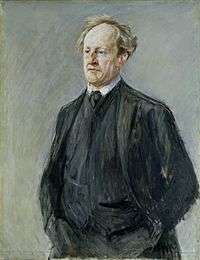
Nevertheless, he was still in demand as a writer and was regarded abroad as the representative poet of Germany. The Hungarian philosopher and literature critic, Georg Lukacs later called Hauptmann the "representative poet of bourgeois Germany," by which he did not mean to underscore Hauptmann's prominent position. Rather, he expressed displeasure with Hauptmann's fickleness and lack of attachment to his "revolutionary beginnings." Despite his preeminence, the sale of his works steadily declined as other poets and playwrights took the spotlight. Hauptmann had taken up a lavish lifestyle, lived in expensive hotels, often received guests, and took trips to Italy. He summered in his large house on the Hiddensee, that Günter Kunert called a "do-it-yourself Olympia." Thomas Mann referred to this lavish lifestyle when he called him in 1922 the "King of the Republic." Mann met Hauptmann at an Alpine resort and wrote to his brother, "I hobnob every evening with Hauptmann, who is a really good fellow." In addition Mann adapted some of Hauptmann's traits for his character Mynheer Peeperkorn in his book The Magic Mountain.[7]
When Hauptmann continued to live in Germany after the Nazis came to power, they attempted to use Hauptmann for their own purposes. Various works that displeased the party leaders were banned but others continued to be performed. At his 80th birthday, in 1942 he was honored by the government with a festival and tributes, which he accepted.
After his death, the fame he had enjoyed in life began to fade. His reputation was further diminished by his uncritical attitude toward the Nazis. Nevertheless, on his 100th birthday in 1962, celebrations were held in many German Cities. Until the 1970s his worlds continued to be performed on West German stages, especially "Der Biberpelz" and "Die Ratten." However, Hauptmann's work was now considered more critically. In this context, some weaker aspects of his work became evident, which before "had been covered through loud and uncritical praise." Furthermore, in the political culture of the sixties and early seventies, Hauptmann's work became less relevant.
In East Germany, Hauptmann's literary reputation lived on. His social critique found appeal in many places and was seen as an example of the continuing tradition of German civic humanism.
Publications
Novels
- Der Narr in Christo Emanuel Quint (1910)
- Atlantis (1912)
- Wanda, der Dämon (1926)
- Die Insel der grossen Mutter (1928)
- Um Volk und Geist (1932)
- Im Wirbel der Berufung (1936)
- Das Abenteuer meiner Jugend (1937)
Short novels
- Bahnwärter Thiel (1888)
- Der Ketzer von Soana (1918)
- Phantom (1923)
- Marginalien (selected works, reports: 1887–1927)
- Das Meerwunder (1934)
- Sonnen (1938)
- Der Schuss im Park (1939)
Verse novels
- Promethidenlos (1885)
- Anna (1921)
- Die blaue Blume (1924)
- Till Eulenspiegel (1927)
- Der grosse Traum (1912–42)
Plays
- Before Sunrise (Vor Sonnenaufgang, 1889)
- The Reconciliation (Das Friedensfest, 1890)
- Lonely People (Einsame Menschen, 1891)[8]
- The Weavers (play) (Die Weber, 1892)
- Colleague Crampton (College Cramption, 1892)
- The Beaver Coat (Der Biberpelz, 1893)
- The Assumption of Hannele (Hanneles Himmelfahrt, 1893)
- Florian Geyer (1896)
- Elga (1896)
- Helios (1896) fragment
- The Sunken Bell (Die versunkene Glocke, 1896)
- Pastoral (Das Hirtenlied, 1898) fragment
- Drayman Henschel (Fuhrmann Henschel, 1898)
- Schluck and Jau (Schluck und Jau, 1900)
- Michael Kramer (1900)
- The Conflagration (Der rote Hahn, 1901)
- Henry of Auë (Der arme Heinrich, 1902)
- Rose Bernd (1903)
- And Pippa Dances (Und Pippa Tanzt!, 1906)
- The Maidens of the Mount (Die Jungfern von Bischofsberg, 1907)
- Charlemagne's Hostage (Kaiser Karls Geisel, 1908)
- Griselda (1909)
- The Rats (play) (Die Ratten, 1911)
- Gabriel Schilling's Flight (Gabriel Schillings Flucht, 1912)
- Peter Brauer (1912)
- Commemoration Masque (Festspiel in deutschen Reimen, 1913)
- The Bow of Odysseus (Der Bogen des Odysseus, 1914)
- Magnus Garbe (1914, second version: 1942)
- Indipohdi (1920)
- Veland (1925)
- Herbert Engelmann (1921–26)
- Spuk (two plays: Die schwarze Maske and Hexenritt, 1928)
- Die goldene Harfe (1933)
- Hamlet in Wittenberg (Hamlet im Wittenberg, 1935)
- Die Finsternisse (1937)
- Ulrich von Lichtenstein (1936–37)
- Die Tochter der Kathedrale (1935–38)
- Die Atriden-Tetralogie:
- Iphigenie in Aulis (1944)
- Agamemnons Tod (1948; written in 1942)
- Elektra (1948; written in 1944)
- Iphigenie in Delphi (1941)
In English translation
- Hannele. A Dream Poem (1894)
- Lonely Lives (1898)
- The Sunken Bell (1899).
- The Coming of Peace (1900)
- And Pippa Dances (1907)
- The Reconciliation (1910)
- The Fool in Christ, Emanuel Quint (1911)
- Atlantis (1912).
- Parsival (1915)
- The Dramatic Works:
- Social Dramas (1912)
- Social Dramas (1913)
- Domestic Dramas (1914)
- Symbolic and Legendary Dramas (1914)
- Symbolic and Legendary Dramas (1915)
- Later Dramas in Prose (1915)
- Miscellaneous Dramas (1917)
- Phantom (1922)
- The Heretic of Soana (1923)
- Lineman Thiel and Other Tales (1989)
Notes
- ↑ "Gerhart Hauptmann - Facts". Nobelprize.org. Nobel Media AB. Retrieved 29 December 2015.
- ↑ Pedersen, Sune Christian, The Titanic Myth , Post & Tele Museum of Denmark, 3rd Quarterly, (2001)
- ↑ http://www.nobelprize.org/nomination/archive/show.php?id=6100
- ↑ (ref to http://www.nobelprize.org/nobel_prizes/literature/laureates/1912/)
- ↑ Heuser, F.W.J. (1938). "Hauptmann's Trip to America," Germanic Review, Vol. 13, pp. 3–31.
- ↑ Gerhart Hauptmann and Silesia: a report on the German dramatist's last days in his occupied homeland (Gerhard Pohl, University of North Dakota etc., 1962)
- ↑ Hayman, Ronald. Thomas Mann: A Biography. Scribner, 1995, p. 344.
- ↑ Also translated as Lonely Lives.
References
- Garten, H.F. (1954). Gerhart Hauptmann. New Haven: Yale University Press.
- Marshall, Alan (1982). The German Naturalists and Gerhart Hauptmann. Frankfurt am Main: Peter Lang.
- Maurer, Warren R. (1992). Understanding Gerhart Hauptmann. Columbia, S.C.: University of South Carolina Press.
- Mellen, Philip A. (1984). Gerhart Hauptmann. Religious Syncretism and Eastern Religions. New York: Peter Lang.
- Osborne, John (1998). Gerhart Hauptmann and the Naturalist Drama. Amsterdam: Harwood Academic.
- Pohl, Gerhart (1962). Gerhart Hauptmann and Silesia. Grand Forks: University of North Dakota Press.
- Shaw, Leroy R. (1958). Witness of Deceit. Gerhart Hauptmann as Critic of Society. Berkeley: University of California Press.
- Skrine, Peter N. (1989). Hauptmann, Wedekind, and Schnitzler. New York: St. Martin's Press.
-
 This article incorporates text from a publication now in the public domain: Chisholm, Hugh, ed. (1911). "Hauptmann, Gerhart". Encyclopædia Britannica (11th ed.). Cambridge University Press.
This article incorporates text from a publication now in the public domain: Chisholm, Hugh, ed. (1911). "Hauptmann, Gerhart". Encyclopædia Britannica (11th ed.). Cambridge University Press.
Further reading
- Downs, Brian W. (1926). "Gerhart Hauptmann," The North American Review, Vol. 223, No. 830, pp. 102–115.
- Dukes, Ashley (1911). Modern Dramatists. London: Frank Palmer.
- Dussère, Carolyn (1980). "An Interpretation of Gerhart Hauptmann's 'Parsival'," Colloquia Germanica, Vol. 13, No. 3, pp. 233–245.
- Campbell, T.M. (1924). "Gerhart Hauptmann—Christian or Pagan?," The Modern Language Journal, Vol. 8, No. 6, pp. 353–361.
- Coates, William Ames (1945). "Dostoyevski and Gerhart Hauptmann," The American Slavic and East European Review, Vol. 4, No. 3/4, pp. 107–127.
- Ewen, David (1935). "Conversations with Gerhart Hauptmann," Books Abroad, Vol. 9, No. 3, pp. 253–254.
- Hale, Edward Everett (1905). "Hauptmann." In: Dramatists of Today. New York: Henry Holt & Company, pp. 37–61.
- Heller, Otto (1905). "Gerhart Hauptmann." In: Studies in Modern German Literature. Boston: Ginn & Company, pp. 117–128.
- Heuser, F.W.J.(1926). "Hauptmann and Novalis," Germanic Review, Vol. 1, pp. 125–131.
- Huneker, James (1919). "Gerhart Hauptmann." In: Iconoclasts. New York: Charles Scribner's Sons, pp. 182–210.
- Kobbé, Gustav (1898). "The Dramas of Gerhart Hauptmann," The Forum, Vol. 24, pp. 432–441.
- Lewisohn, Ludwig (1912). "Introduction." In: The Dramatic Works, Vol. 1. London: Martin Secker, pp. ix–xxxvii.
- Maurer, Warren R. (1979). "Gerhart Hauptmann's Character Names," The German Quarterly, Vol. 52, No. 4, pp. 457–471.
- Muller, Siegfried H. (1952). "Gerhart Hauptmann's Relation to American Literature and His Concept of America," Monatshefte, Vol. 44, No. 7, pp. 333–339.
- Reichart, Walter A. (1946). "The Totality of Hauptmann's Work," Germanic Review, Vol. 21, pp. 143–149.
- Reichart, Walter A. (1962). "Hauptmann Study in America: A Continuation Bibliography," Monatshefte, Vol. 54, No. 6, pp. 297–310.
- Robertson, John G. (1902). A History of German Literature. New York: G.P. Putnam's Sons.
- Scholz, Karl W.H. (1918). The Art of Translation. Philadelphia: Americana Germanica Press.
- Thompson, Nesta M. (1920). "Naturalism and the Dream Motive as Observed in the Works of Gerhart Hauptmann," Washington University Studies, Vol. 8, pp. 77–101.
- Wahr, F.B. (1946). "Hauptmann's Hellenism," Journal of English and Germanic Philology, Vol. 33, pp. 421–451.
- Wiehr, Josef (1906). "The Naturalistic Plays of Gerhart Hauptmann," The Journal of English and Germanic Philology, Vol. 6, No. 1, pp. 1–71; Part II, Vol. 6, No. 4, pp. 531–575.
- Witkowski, Georg (1909). The German Drama of the Nineteenth-century. London: George Bell & Sons.
- Youngman, Paul A. (2005). "Gerhart Hauptmann." In: Black Devil and Iron Angel. The Railway in Nineteenth-century German Realism. Washington, D.C.: Catholic University of America Press, pp. 109–127.
- Schweissinger, Marc: Gerhart Hauptmann`s Hamlet `translation`, In: Anglistica Pisana 8(2), pp. 11-24.
External links
| Wikimedia Commons has media related to Gerhart Hauptmann. |
- The Nobel Prize Bio on Hauptmann
- Works by Gerhart Hauptmann at Project Gutenberg
- Works by or about Gerhart Hauptmann at Internet Archive
- Works by Gerhart Hauptmann at Hathi Trust
- The Dramatic Works of Gerhart Hauptmann and Japanese Translation